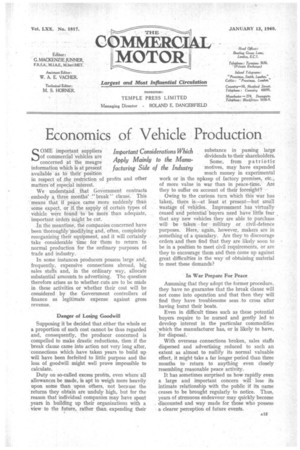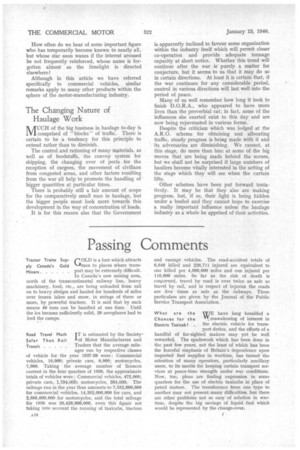Economics of Vehicle Production
Page 17

Page 18

If you've noticed an error in this article please click here to report it so we can fix it.
SOME important suppliers of commercial vehicles are Important Considerations Which concerned at the meagre Apply Mainly to the Man*" information which is at present facturing Side of the Industry available as to their position in respect of the restriction of profits and other work or in the matters'of especial interest.
We understand that Government contracts embody a three months' " break " clause. ' This means that if peace came more suddenly than • some expect, or if the supply of certain types of vehicle were found to be more than adequate, important orders might be cut.
In the meantime, the companies concerned have been thoroughly modifying and often, completely reorganizing their equipment, and it will certainly take considerable time for them to return to normal production for the ordinary purposes of trade and industry.
In some instances producers possess large and, frequently, expensive connections abroad, big sales staffs and, in the ordinary way, allocate substantial amounts to advertising. The question therefore arises as to whether cuts are to be nrade in these activities or whether their cost will be considered by the Government controllers of finance as legitimate expense against gross revenue.
Danger of Losing Goodwill Supposing it be decided that either the whole or a proportion of such cost cannot be thus regarded and, consequently, the producer concerned is compelled to make drastic reductions, then if the break clause came into action not very long after, -connections which have taken years to build up will have been forfeited to little purpose and the loss of goodwill might well prove impossible to calculate.
Duty on so-called excess profits, even where all allowances be made, is apt to weigh more heavily upon some than upon others, not because the returns they obtain are unduly high, but for the reason that individual companies may have spent years in building up their organizations with a view to the future, rather than expending their substance in passing large dividends to their shareholders.
Some, from patriotic motives, may have expended much money in experimental upkeep of factory premises, etc., of more value in war than in peace-time. Are they to suffer on account of their foresight?
Owing to the curious turn which this war has taken, there is—at least at present—but small wastage of vehicles., Impressment has virtually ceased and potential buyers need have little fear that any new vehicles they are able to purchase will be taken for military or civil-defence purposes. Here, again, however, makers are in something of a quandary. Are they to discourage orders and then find that they are likely soon to • be in a position to meet civil requirements, or are they to encourage them and then come up against great difficulties in the way of obtaining material to meet these demands?
In War Prepare For Peace Assuming that they adopt the former procedure, they have no guarantee that the break clause will not come into operation and that then they will find they have troublesome seas to cross after having burnt their boats.
Even in difficult times such as these potential buyers require to be nursed and gently led to develop interest in the particular commodities ,which• the manufacturer has, or is likely to have, for disposal.
With overseas connections broken, sales staffs dispersed and advertising reduced to such an extent as almost to nullify its normal valuable effect, it might take a far longer period than three months to• return to anything even closely resembling reasonable peace activity.
It has sometimes surprised us how rapidly even a large and important concern will lose its intimate relationship with the public if its name ceases to be brought regularly to notice. Thus, years of strenuous endeavour may quickly become discounted and way made for those who possess a clearer perception of future events. How often do we hear of some important figure who has temporarily become known to nearly all, but whose star soon wanes if the interest aroused be not frequently reinforced, whose name is forgotten almost as the limelight is directed elsewhere?
Although in this article we have referred specifically to commercial vehicles, similar remarks apply to many other products within the sphere of the motor-manufacturing industry.
The Changing Nature of Haulage Work
MUCH of the big business in haulage to-day is comprised of "blocks" of traffic. There is certain to be a tendency for this principle to extend rather than to diminish.
The control and rationing of many materials, as well as of foodstuffs, the convoy system for shipping, the changing over of ports for the reception of cargoes, the movement of civilians from congested areas, and other factors resulting from the war all help to promote the handling of • bigger quantities at particular times.
There is probably still a fair amount of scope for the comparatively small man in haulage, but the bigger people must look more towards this development in the way of concentration of loads.
It is for this reason also that the Government is apparently inclined to favour some organization within the industry itself which will permit closer co-operation and provide adequate tonnage capacity at short notice. Whether this trend will continue after the war is purely a matter for conjecture, but it seems to us that it may do so in certain directions. At least it is certain that, if the war continues for any considerable period, control in various directions will last well into the period of peace.
Many of us well remember how long it took to finish D.O.R.A., who appeared to have more lives than the proverbial cat; in fact, some of the influences she exerted exist to this day and are now being rejuvenated in various forms.
Despite the criticism which was lodged at the A.R.O. scheme for obtaining and allocating traffic, steady progress is being made with it and its adversaries are diminishing. We cannot, at this stage, do more than hint at some of the big moves that are being made behind the scenes, but we shall not be surprised if large numbers of hauliers become vitally interested in the setting of the stage which they will see when the curtain lifts.
Other schemes have been put forward tentatively. It may be that they also are making progress, but, if so, their light is being hidden under a bushel and they cannot hope to exercise a really important influence unless the haulage industry as a whole be apprised of their activities.




























































